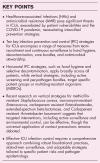Update on infection prevention in the ICU
- PMID: 40910660
- PMCID: PMC12573679
- DOI: 10.1097/MCC.0000000000001313
Update on infection prevention in the ICU
Abstract
Purpose of review: Healthcare-associated infections (HAIs) remain a critical challenge in intensive care units (ICUs) due to the high prevalence of invasive procedures, vulnerable patient populations, and the increasing threat of antimicrobial-resistant organisms (MDROs). This review synthesizes current evidence on infection prevention and control (IPC) strategies in the ICU setting, highlighting recent findings and innovations in this evolving field, particularly in light of the impact of the COVID-19 pandemic.
Recent findings: The review outlines ten key IPC strategies for ICUs, categorizing them into horizontal (universal) and vertical (pathogen-specific) approaches. Recent literature emphasizes the importance of enhanced hand hygiene compliance through motivational interventions and feedback. The role of selective decontamination strategies remains debated, with evidence suggesting potential benefits in specific patient subgroups. Vertical strategies, including active screening for MDROs and per-pathogen bundles, are increasingly being tailored based on local epidemiology and pathogen characteristics. Studies suggest that de-escalating routine contact precautions for certain MDROs like Methicillin-resistant Staphylococcus aureus and Vancomycin-resistant Enterococcus may be safe in settings with robust horizontal measures. Conversely, intensified "search and destroy" strategies show promise in controlling carbapenem-resistant Acinetobacter baumannii outbreaks.
Summary: Effective IPC in the ICU requires a multifaceted and adaptable approach, integrating both universal precautions and targeted interventions against specific pathogens. While consistent implementation of horizontal strategies like hand hygiene is foundational, tailoring vertical strategies based on local MDRO epidemiology and patient risk profiles is crucial. Future research should focus on harmonizing IPC policies, optimizing screening methods, and evaluating the long-term impact of combined IPC and antimicrobial stewardship programs to improve patient outcomes and mitigate the spread of antimicrobial resistance in critical care settings.
Keywords: antimicrobial resistance; healthcare-associated infections; infection prevention; intensive care unit; multidrug-resistant organisms.
Copyright © 2025 Wolters Kluwer Health, Inc. All rights reserved.
Conflict of interest statement
References
-
- Kernéis S, Lucet JC. Controlling the diffusion of multidrug-resistant organisms in intensive care units. Semin Respir Crit Care Med 2019; 40:558–568. - PubMed
Publication types
MeSH terms
LinkOut - more resources
Full Text Sources
Medical
Research Materials


